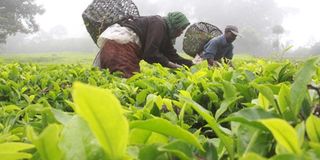Sudan reverses sell-by date order for Kenya tea

A tea plantation in Nyeri county. Sudan has suspended the decision to cut the shelf life of Kenyan tea from three to one-and-a-half years that saw sales to Khartoum drop by 30 per cent last year. PHOTO | FILE
What you need to know:
- Sudan has suspended the decision to cut the shelf life of Kenyan tea from three to one-and-a-half years that saw sales to Khartoum drop by 30 per cent last year.
- The changes had been made by the Sudan Standards and Metrology Organisation (SSMO) last year.
- Kenya Bureau of Standards Managing Director Charles Ongwae said the joint committee had been formed with the SSMO and other government agencies to carry out scientific research on the actual shelf life of tea.
Sudan has suspended the decision to cut the shelf life of Kenyan tea from three to one-and-a-half years that saw sales to Khartoum drop by 30 per cent last year.
The two governments agreed on Wednesday that the guidelines be suspended for six months pending a joint technical research team that will determine the actual shelf life of the beverage.
The changes had been made by the Sudan Standards and Metrology Organisation (SSMO) last year. Tea exports to Sudan last year dropped to 19 million kilogrammes from 27 million kilogrammes exported in the previous year, with the officials attributing the decline to the new guidelines.
The decline saw Sudan drop to position seven last year from number five in 2014 on the list of top purchasers of Kenyan tea.
Agriculture Fisheries and Food Authority Director-General Alfred Busolo welcomed the move.
“It is a reprieve to our tea industry as Sudan has agreed to suspend its decision on the shelf life, giving us an opportunity to continue enjoying tea exports to the country as we address the outstanding issues,” said Mr Busolo.
He said the move had resulted in tea buyers cutting down on their stocks and hence hurting export volumes.
Kenya Bureau of Standards Managing Director Charles Ongwae said the joint committee had been formed with the SSMO and other government agencies to carry out scientific research on the actual shelf life of tea.
“The suspension gives us time to conduct research and come out with conclusive findings on the shelf life of the commodity,” said Mr Ongwae.
Kenya last year, through a Joint Ministerial Commission meeting between Foreign ministry officials from both countries, urged Khartoum to reverse its decision.
During the meeting, the Kenyan delegation, led by Foreign Affairs Cabinet Secretaryr Amina Mohamed, argued the decision meant Kenyan traders would incur more storage costs and losses if they don’t make sales on time.
Tea earnings are expected to drop this year due to the crop's poor performance in the third and fourth quarter of 2015/16.
The agriculture regulator expects the performance to decline because of low prices seen since the beginning of January resulting from overproduction caused by good rains last year. Mr Busolo said the earnings could drop from Sh123 billion in 2014/15 to Sh120 billion.
“The earnings for this financial year are going to decline marginally because of low prices experienced in the last two quarters of the year,” he said.
The price of tea has been declining since the beginning of the year, failing to rebound to a high of Sh273 seen in the first auction of 2016.
Kenya is the world’s largest exporter of black tea and an oversupply of the commodity in 2014 led to a sharp drop in global prices. The glut also cut farmers’ bonuses to levels last seen seven years ago.




